英语简单句的五种基本类型
图片预览
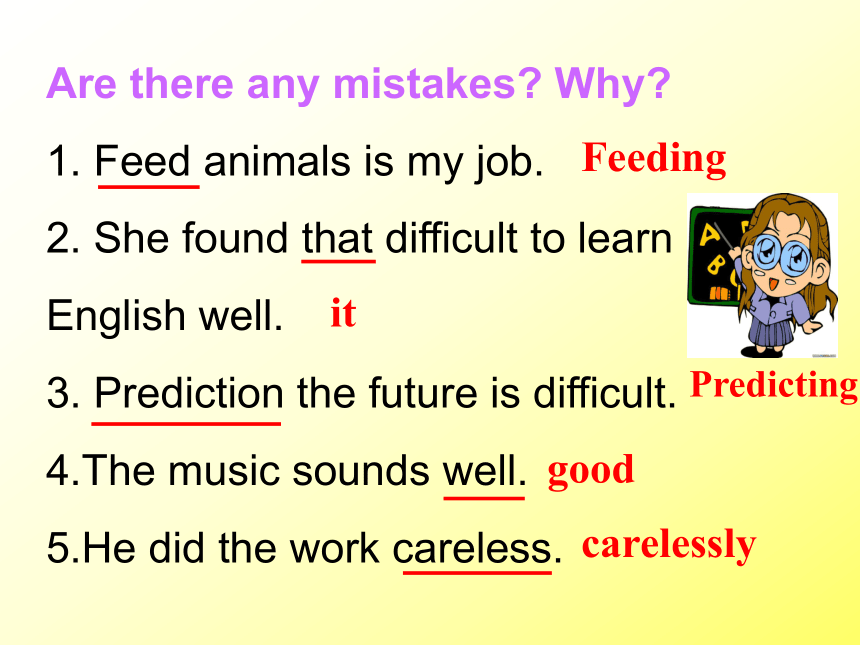
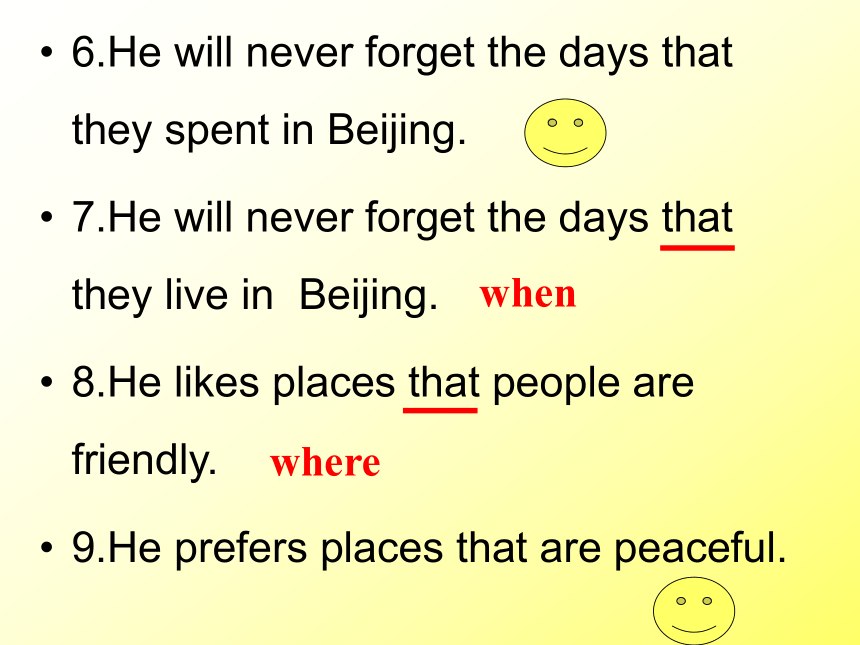

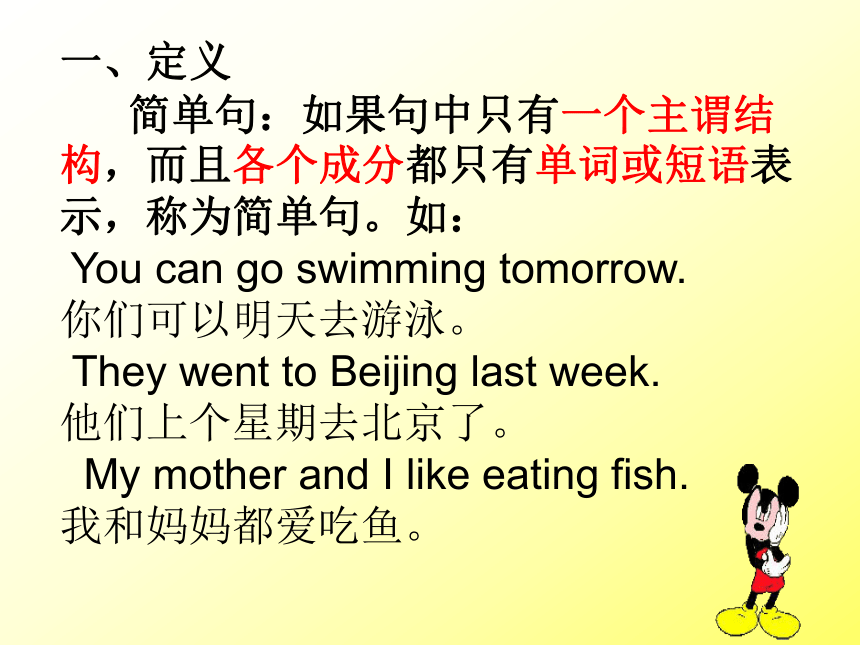

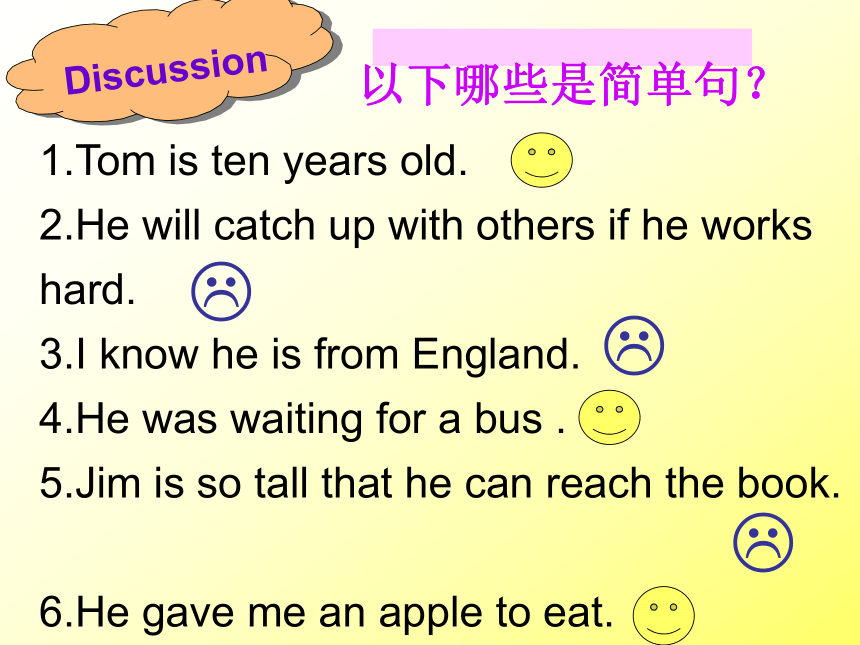
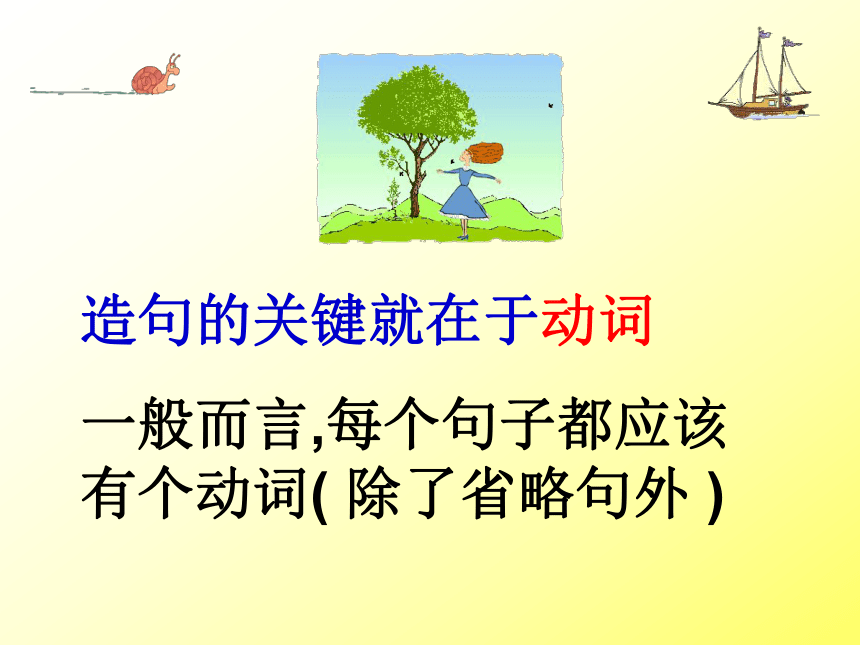
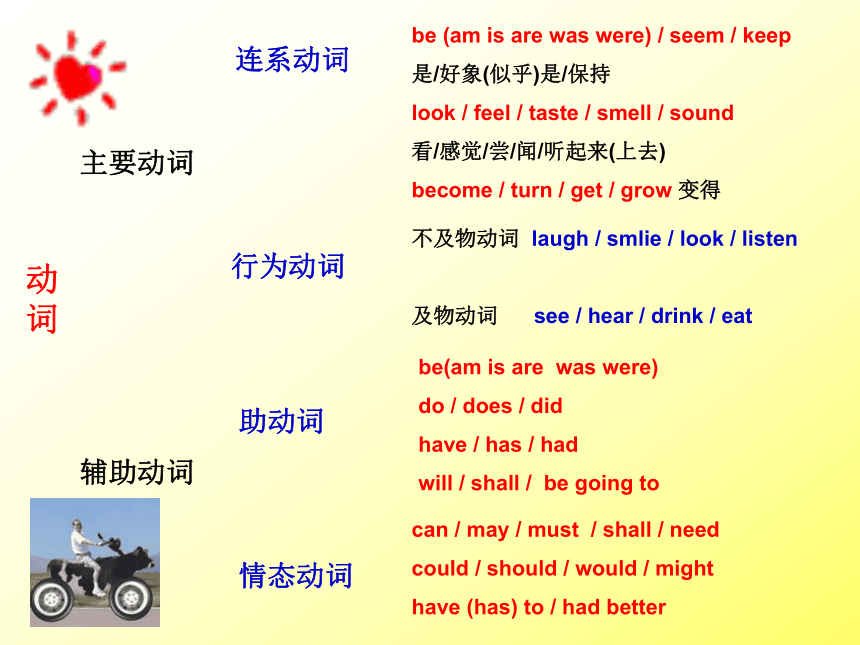
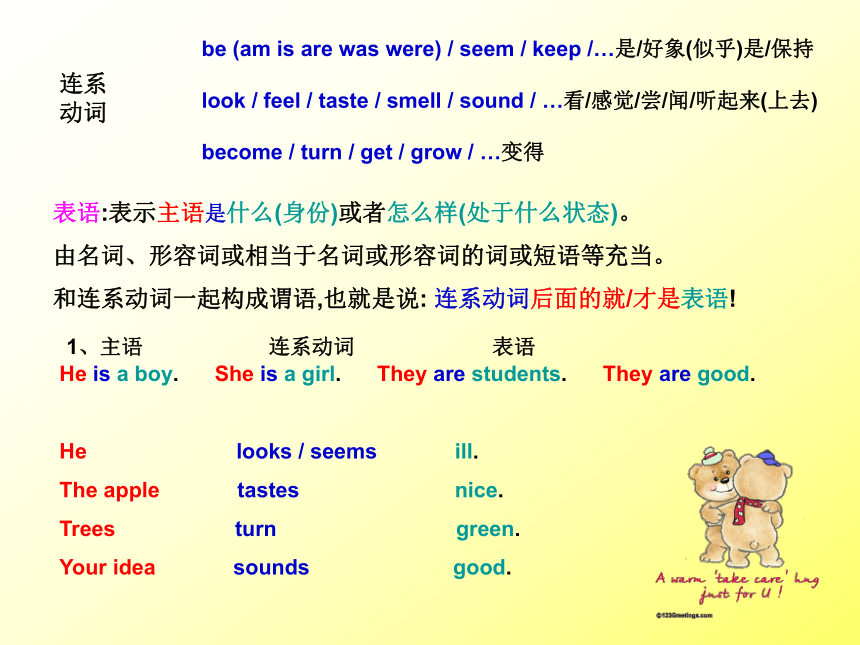
文档简介
(共24张PPT)
Are there any mistakes Why
1. Feed animals is my job.
2. She found that difficult to learn English well.
3. Prediction the future is difficult.
4.The music sounds well.
5.He did the work careless.
Feeding
it
Predicting
good
carelessly
6.He will never forget the days that they spent in Beijing.
7.He will never forget the days that they live in Beijing.
8.He likes places that people are friendly.
9.He prefers places that are peaceful.
when
where
简单句的五种基本类型
一、定义
简单句:如果句中只有一个主谓结构,而且各个成分都只有单词或短语表示,称为简单句。如:
You can go swimming tomorrow.
你们可以明天去游泳。
They went to Beijing last week.
他们上个星期去北京了。
My mother and I like eating fish.
我和妈妈都爱吃鱼。
按结构分
一个完整的简单句由 “主语部分+谓语部分”构成
The man is a teacher.
He works hard.
He teaches English well.
主语部分 谓语部分
主语部分 谓语部分
主语部分 谓语部分
1.Tom is ten years old.
2.He will catch up with others if he works hard.
3.I know he is from England.
4.He was waiting for a bus .
5.Jim is so tall that he can reach the book.
6.He gave me an apple to eat.
Discussion
以下哪些是简单句?
造句的关键就在于动词
一般而言,每个句子都应该有个动词( 除了省略句外 )
动词
连系动词
主要动词
行为动词
助动词
辅助动词
情态动词
be (am is are was were) / seem / keep
是/好象(似乎)是/保持
look / feel / taste / smell / sound
看/感觉/尝/闻/听起来(上去)
become / turn / get / grow 变得
不及物动词 laugh / smlie / look / listen
及物动词 see / hear / drink / eat
be(am is are was were)
do / does / did
have / has / had
will / shall / be going to
can / may / must / shall / need
could / should / would / might
have (has) to / had better
连系动词
be (am is are was were) / seem / keep /…是/好象(似乎)是/保持
look / feel / taste / smell / sound / …看/感觉/尝/闻/听起来(上去)
become / turn / get / grow / …变得
表语:表示主语是什么(身份)或者怎么样(处于什么状态)。
由名词、形容词或相当于名词或形容词的词或短语等充当。
和连系动词一起构成谓语,也就是说: 连系动词后面的就/才是表语!
He is a boy. She is a girl. They are students. They are good.
He looks / seems ill.
The apple tastes nice.
Trees turn green.
Your idea sounds good.
1、主语 连系动词 表语
He is working.
They are watching TV.
He is eating the food.
主语Subject :
表示句子所说的是“什么人”或“什么事物” 。
也就是动作的发出者。(主动语态)
一般由名词、代词或相当于名词、代词的词或短语等充当。
谓语Predicate :
说明主语“做什么”、“是什么”或者“怎么样”。
也就是做了什么行为动作或处于什么状态。
谓语(谓语部分里主要的词)用动词。
宾语Object :
表示动作、行为的对象。
也就是动作的接受者。
一般由名词、代词或相当于名词的词或短语等充当。
狗 咬 人 。
主语 谓语 宾语
人 咬 狗 。
主语 谓语 宾语
2、主语+及物动词+宾语
He
likes
basketball game.
He
plays
computer games
every day.
He
played
soccer
yesterday.
He
is playing
the guitar
now.
及物动词
主谓宾结构=主语+及物动词+宾语
只能用不定式作宾语的常见动词:want, hope, would like, decide, agree, ask, can't wait等;
只能用动名词作宾语的常见动词:mind, enjoy, keep, finish, can't help等;
既能用不定式又能用动名词作宾语,且有区别的常见动词:
1.remember to do.。。记住要做……(还未做)
remember doing.。。记得做了……(已做过)
2.forget to do.。。忘了做……(还未做)
forget doing.。。忘了做过……(已做过)
…
3. stopto do.。。停下来去做……
stop doing.。。停止做…
4. go on to do.。。接下来去做……
go on doing.。。继续做……
5. try to do.。。尽力做……
try doing.。。试着做……
既能用不定式又能用动名词作宾语,且无区别的常见动词:
begin,start,like,love,hate等。
及物动词是后面可以直接跟宾语的动词:
see / hear / drank / eat / …
I saw him last week.
We heard the bad news yesterday.
不及物动词是后面不可以直接跟宾语的动词: laugh / smile / look / listen / …
She smiled happily.
They laughed loudly.
如果要加宾语,就要靠一个介词来帮助:
She look at the blackboard carefully.
They laughed at us after the match.
什么是及物动词和不及物动词呢 !
The doctor listened carefully.
The worker ran fast.
The boy is fishing.
The woman walks slowly.
3、主语+不及物动词
有些词既是及物动词又是不及物动词,那就要看意思上的区别了:
他们放风筝。
They fly the kites.
风筝在天上飞。
The kites fly in the sky.
He gave me a present.
She teaches us.
She teaches English.
She teaches us English.
She told me a story.
及物动词
4、主谓双宾结构=主语+及物动词+间接宾语+直接宾语
可以用于这种句式的动词主要有
(A) buy / build / cook / find / get / make / draw
He bought me a new bike.
也可以改为for sb. 的句式
He bought a new bike for me.
(B) give / take / send / bring / teach / show / tell / pay / write / read / sell / lend / pass / return / throw / offer / hand
She lent me a book.
也可以改为 to sb. 的句式 She lent a book to me.
5.主谓宾宾补结构(SVOC)
=主语+谓语+宾语+宾语的补足语
He
told
me
to clean my room.
I
saw
her
dancing.
Our teacher
asks
us
to read English
every day.
及物动词
可以用于这种句式的动词主要有
let / make sb. do sth.
ask / tell / want / allow / wish / get /
sb. to do sth.
expect / encourage / invite / teach
find / see / hear / watch / notice / feel sb. do sth.
sb. doing sth.
help sb. (to) do sth.
有时宾语不是一个名词或代词,而是一个从句、不定式或动名词,这时通常要用一个it来代替它(即形式宾语),则把从句、不定式或动名词放到句子后部去。例如:
①They found it strange that no one would take the money.
②You will feel it a great pleasure talking to her.
[1] 主系表型
She is a very good girl .
(__语) (__词) (___语)
The girl is very good.
(__语) (__词) (___语)
原来也蛮简单的哦!我来分析一下这些句子中所包含的成分
[2] 主谓型
<1>______式: They ‖ laughed.
(__语) (__词)
<2>______式: I ‖ bought a new bike.
(__语) (__词) (__语)
<3>______式: She ‖ told me a story.
(__语) (__词) (__语) (__语)
<4>______式 He ‖ asked me to help him.
(__语) (__词) (__语) (__语)
The boy is asleep.
The boy is sleeping.
主谓宾
主谓
The boy is playing the guitar.
His music is very beautiful.
It is beautiful music.
主系表
He is playing happily.
判断这些句子的类型并
理解be动词的双重身份
(连系动词/助动词)
Are there any mistakes Why
1. Feed animals is my job.
2. She found that difficult to learn English well.
3. Prediction the future is difficult.
4.The music sounds well.
5.He did the work careless.
Feeding
it
Predicting
good
carelessly
6.He will never forget the days that they spent in Beijing.
7.He will never forget the days that they live in Beijing.
8.He likes places that people are friendly.
9.He prefers places that are peaceful.
when
where
简单句的五种基本类型
一、定义
简单句:如果句中只有一个主谓结构,而且各个成分都只有单词或短语表示,称为简单句。如:
You can go swimming tomorrow.
你们可以明天去游泳。
They went to Beijing last week.
他们上个星期去北京了。
My mother and I like eating fish.
我和妈妈都爱吃鱼。
按结构分
一个完整的简单句由 “主语部分+谓语部分”构成
The man is a teacher.
He works hard.
He teaches English well.
主语部分 谓语部分
主语部分 谓语部分
主语部分 谓语部分
1.Tom is ten years old.
2.He will catch up with others if he works hard.
3.I know he is from England.
4.He was waiting for a bus .
5.Jim is so tall that he can reach the book.
6.He gave me an apple to eat.
Discussion
以下哪些是简单句?
造句的关键就在于动词
一般而言,每个句子都应该有个动词( 除了省略句外 )
动词
连系动词
主要动词
行为动词
助动词
辅助动词
情态动词
be (am is are was were) / seem / keep
是/好象(似乎)是/保持
look / feel / taste / smell / sound
看/感觉/尝/闻/听起来(上去)
become / turn / get / grow 变得
不及物动词 laugh / smlie / look / listen
及物动词 see / hear / drink / eat
be(am is are was were)
do / does / did
have / has / had
will / shall / be going to
can / may / must / shall / need
could / should / would / might
have (has) to / had better
连系动词
be (am is are was were) / seem / keep /…是/好象(似乎)是/保持
look / feel / taste / smell / sound / …看/感觉/尝/闻/听起来(上去)
become / turn / get / grow / …变得
表语:表示主语是什么(身份)或者怎么样(处于什么状态)。
由名词、形容词或相当于名词或形容词的词或短语等充当。
和连系动词一起构成谓语,也就是说: 连系动词后面的就/才是表语!
He is a boy. She is a girl. They are students. They are good.
He looks / seems ill.
The apple tastes nice.
Trees turn green.
Your idea sounds good.
1、主语 连系动词 表语
He is working.
They are watching TV.
He is eating the food.
主语Subject :
表示句子所说的是“什么人”或“什么事物” 。
也就是动作的发出者。(主动语态)
一般由名词、代词或相当于名词、代词的词或短语等充当。
谓语Predicate :
说明主语“做什么”、“是什么”或者“怎么样”。
也就是做了什么行为动作或处于什么状态。
谓语(谓语部分里主要的词)用动词。
宾语Object :
表示动作、行为的对象。
也就是动作的接受者。
一般由名词、代词或相当于名词的词或短语等充当。
狗 咬 人 。
主语 谓语 宾语
人 咬 狗 。
主语 谓语 宾语
2、主语+及物动词+宾语
He
likes
basketball game.
He
plays
computer games
every day.
He
played
soccer
yesterday.
He
is playing
the guitar
now.
及物动词
主谓宾结构=主语+及物动词+宾语
只能用不定式作宾语的常见动词:want, hope, would like, decide, agree, ask, can't wait等;
只能用动名词作宾语的常见动词:mind, enjoy, keep, finish, can't help等;
既能用不定式又能用动名词作宾语,且有区别的常见动词:
1.remember to do.。。记住要做……(还未做)
remember doing.。。记得做了……(已做过)
2.forget to do.。。忘了做……(还未做)
forget doing.。。忘了做过……(已做过)
…
3. stopto do.。。停下来去做……
stop doing.。。停止做…
4. go on to do.。。接下来去做……
go on doing.。。继续做……
5. try to do.。。尽力做……
try doing.。。试着做……
既能用不定式又能用动名词作宾语,且无区别的常见动词:
begin,start,like,love,hate等。
及物动词是后面可以直接跟宾语的动词:
see / hear / drank / eat / …
I saw him last week.
We heard the bad news yesterday.
不及物动词是后面不可以直接跟宾语的动词: laugh / smile / look / listen / …
She smiled happily.
They laughed loudly.
如果要加宾语,就要靠一个介词来帮助:
She look at the blackboard carefully.
They laughed at us after the match.
什么是及物动词和不及物动词呢 !
The doctor listened carefully.
The worker ran fast.
The boy is fishing.
The woman walks slowly.
3、主语+不及物动词
有些词既是及物动词又是不及物动词,那就要看意思上的区别了:
他们放风筝。
They fly the kites.
风筝在天上飞。
The kites fly in the sky.
He gave me a present.
She teaches us.
She teaches English.
She teaches us English.
She told me a story.
及物动词
4、主谓双宾结构=主语+及物动词+间接宾语+直接宾语
可以用于这种句式的动词主要有
(A) buy / build / cook / find / get / make / draw
He bought me a new bike.
也可以改为for sb. 的句式
He bought a new bike for me.
(B) give / take / send / bring / teach / show / tell / pay / write / read / sell / lend / pass / return / throw / offer / hand
She lent me a book.
也可以改为 to sb. 的句式 She lent a book to me.
5.主谓宾宾补结构(SVOC)
=主语+谓语+宾语+宾语的补足语
He
told
me
to clean my room.
I
saw
her
dancing.
Our teacher
asks
us
to read English
every day.
及物动词
可以用于这种句式的动词主要有
let / make sb. do sth.
ask / tell / want / allow / wish / get /
sb. to do sth.
expect / encourage / invite / teach
find / see / hear / watch / notice / feel sb. do sth.
sb. doing sth.
help sb. (to) do sth.
有时宾语不是一个名词或代词,而是一个从句、不定式或动名词,这时通常要用一个it来代替它(即形式宾语),则把从句、不定式或动名词放到句子后部去。例如:
①They found it strange that no one would take the money.
②You will feel it a great pleasure talking to her.
[1] 主系表型
She is a very good girl .
(__语) (__词) (___语)
The girl is very good.
(__语) (__词) (___语)
原来也蛮简单的哦!我来分析一下这些句子中所包含的成分
[2] 主谓型
<1>______式: They ‖ laughed.
(__语) (__词)
<2>______式: I ‖ bought a new bike.
(__语) (__词) (__语)
<3>______式: She ‖ told me a story.
(__语) (__词) (__语) (__语)
<4>______式 He ‖ asked me to help him.
(__语) (__词) (__语) (__语)
The boy is asleep.
The boy is sleeping.
主谓宾
主谓
The boy is playing the guitar.
His music is very beautiful.
It is beautiful music.
主系表
He is playing happily.
判断这些句子的类型并
理解be动词的双重身份
(连系动词/助动词)
同课章节目录
- 词法
- 名词
- 动词和动词短语
- 动词语态
- 动词时态
- 助动词和情态动词
- 非谓语动词
- 冠词
- 代词
- 数词和量词
- 形容词副词及其比较等级
- 介词和介词短语
- 连词和感叹词
- 构词法
- 相似、相近词比较
- 句法
- 陈述句
- 一般疑问句和否定疑问句
- 特殊疑问句及选择疑问句
- 反意疑问句
- 存在句(There be句型)
- 宾语从句
- 定语从句
- 状语从句
- 主谓一致问题
- 简单句
- 并列句
- 复合句
- 主谓一致
- 主、表语从句
- 名词性从句
- 直接引语和间接引语
- 虚拟语气
- 感叹句
- 强调句
- 倒装句
- 祈使句
- 句子的成分
- 句子的分类
- 题型专区
- 单项选择部分
- 易错题
- 完形填空
- 阅读理解
- 词汇练习
- 听说训练
- 句型转换
- 补全对话
- 短文改错
- 翻译
- 书面表达
- 任务型阅读
- 语法填空
- 其他资料
